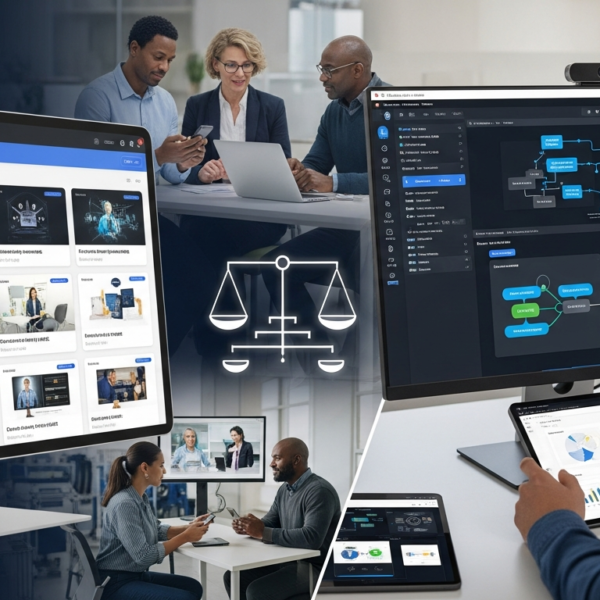Of course, and for whatever reason, we don’t all have the same initial educational background. On the other hand, the desire to evolve and personal fulfillment often stem from the professional context in which we evolve. Thus, a company that allows all its employees to be able to train regularly promotes better commitment and a stronger sense of belonging to the company, contrary to the preconceived idea that only the salary motivates employees.
Indeed, even if it remains important, the salary is not the only motivation of an employee, far from it. As stated in The Workforce View in Europe 2018 study conducted by Opinion Matters for ADP, the Top 3 motivating factors would be:
- The mission’s relevancy;
- Skills development / career development;
- The working atmosphere.
Let’s look at the second point: skills development.
While there are countless documents, articles, e-learning modules and other explanatory videos to develop knowledge, skills are acquired through practice and, more precisely, in context.
In business, training to acquire skills is rare. Until recently, it was the prerogative of face-to-face training, with its practical work sessions and role-playing games, but since the COVID-19 health crisis, Blended Learning and digital devices are gaining momentum. Opportunity in adversity?
To develop soft skills, for example, logistics and training costs quickly become challenging for training managers and HRDs, when face-to-face is preferred. This is the reason why, when we analyze the operation of this type of training in companies, we realize that very often, those who follow them are executives and people with managerial responsibilities.
Is it because the OPCOs support too little to train everyone and raise their skills? Is it because the number of people to be trained in the company is too large to ensure logistics that do not mobilize the entire company during this period? Probably a bit of both.
The fact is that the company then splits into two parts: those who develop their soft skills (at the top of the hierarchical ladder) and the others (the mass of employees who very often provide most of the operational business).
The problem is that those who follow these training courses, approximately 15% of the payroll, are very often those who have had the most complete educational backgrounds and who have subsequently been able to acquire many skills, more than 85% of the rest of the workforce. The gap is therefore widening every day a little more in business!
Let’s develop everyone’s skills together.
From the company’s perspective, this is a miscalculation. Indeed, improving the skills of 15% of the company’s employees by 10% is probably less relevant than improving the skills of the remaining 85% in the same proportion. An effective way to transform the company in order to train everyone is to use the best digital solutions according to their needs.
Let’s start at the beginning. When Microsoft researchers established their skills-wheel in 2006, they grouped the skills to be acquired during schooling into six categories in a repository:
- The intrinsic skills of the individual;
- Relational skills;
- Operational skills;
- Strategic skills;
- Organizational skills;
- Results management.
In business, these academic skills translate a little differently. In 2018, Pôle Emploi published its barometer of the behavioral skills most expected by employers, mainly : adaptability, ability to organize/prioritize tasks, autonomy.
It seems clear that all these skills are acquired with experience and practice. If we go back to the previous point establishing that 15% of employees in companies improve their skills by having access to this type of training, it is the employability of the remaining 85% that is undermined.
This is why more and more companies are turning to digital training and skills acquisition tools, such as simulations, serious games and other realistic situations. Some even go so far as to design real virtual skills assessments in order to identify new professional projects with a view to developing internal mobility, like our customers and partners Axomega-Care.
Indeed, Florence Jary and Emmanuelle Gruia, founders, have been able to innovate by offering their clients a “Psygital” approach to their offer thanks to VTS Editor, namely: interactive assessment and professional development programs developed by psychologists and HR experts, and accompanied by the best professional coaches on the market.
These programs are based on 3D simulations accessible remotely, making it possible to create tailor-made professional development paths by giving everyone the means to objectively identify their strengths and areas for improvement. Blended Learning at its finest.
By democratizing these uses, we give everyone the opportunity to develop their skills. We thus reduce the social divide between the different strata of the company by allowing the less visible to flourish and come out of the shadows, we promote the employability of all, and we develop innovation, the main guarantee of success. in a demanding international market.
Do you want to adopt a tool to create innovative, immersive and gamified training simulations? VTS Editor is made for you!
Start designing your first simulations without obligation by downloading the trial version:











